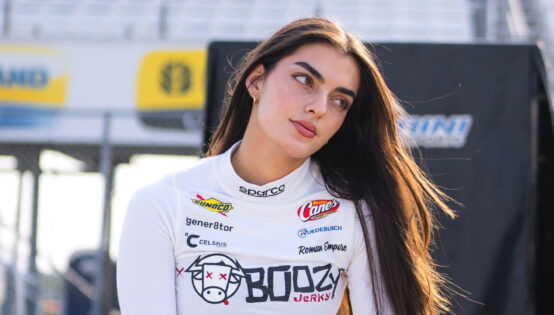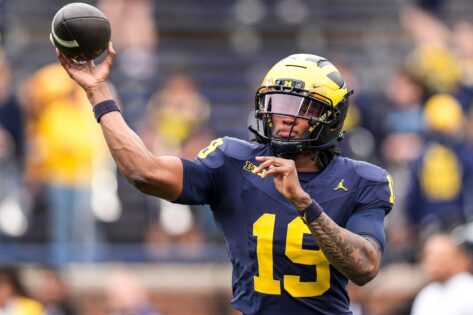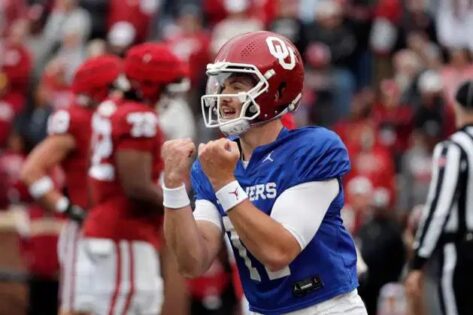Over the years, Toni Breidinger has become a true fan favorite in NASCAR’s Truck Series, with a massive social media following of over 2.5 million on Instagram and a reputation for genuine engagement. As the first Arab-American woman to compete full-time in a NASCAR national series and model, she often meets fans head-on. In 2025, she even served as Dave & Buster’s ambassador, hosting exclusive meet-and-greets in New York and Chicago, where supporters could snag signed Breidinger’s gear, pose for photos, and even race alongside her in arcade games. She talks fondly of “competing with fans who love racing as much as I do,” and fans love how accessible she is, whether responding to letters and DMs or surprising followers with personal shout-outs. With big sponsors like 818 Tequila, Coach, and friendly anecdotes at every turn, Breidinger’s relationship with her fan base has seemed like a perfect community. But little did anyone suspect the loving harmony was about to take a shocking turn.
In early August 2025, Breidinger’s own day was upended by theft. She posted on X, writing, “Anyone in the Ithaca NY area! My car was broken into last night, and my suitcase was stolen. It’s a custom Tumi suitcase with TB on it. Inside were personal items, including my 818 and Coach suits. If you happen to see a suitcase or my racing stuff that’s being sold on Facebook Marketplace, OfferUp, Craigslist, or anywhere else, please send me the link.” Her racing firesuits and personal kit were gone, stolen en route to Watkins Glen. The outpouring of support was immediate, as fans scoured online marketplaces and offered tips. But just as Breidinger pleaded for help to recover her belongings, a stranger-off-the-track story emerged that would bring the flip side of fandom into sharp focus.
The story was shared widely across social media forums. On Reddit, a 59-year-old fan from Grand Haven, Michigan, described a chilling scam. He recounted messaging an account pretending to be Ton Breidinger on TikTok and Instagram. After chatting for days, they supposedly “arranged a private dinner,” and he “trusted her” so completely that he wired thousands of dollars to the account. In his own words, “we chatted for a few days and even arranged [a] private dinner… ended up sending over a couple thousand dollars this past week,” only to be abruptly ghosted when the imposter vanished. He later realized that he had confided in and invested in someone he thought was his hero, only to be duped. Ironically, Breidinger had long warned fans about these very schemes, tweeting that she’d “never ask you for money or sell fan club/VIP cards… There are 100000000 fake accounts of me… So be smart out there.” This story became a cautionary example that even savvy racing fans can be outmaneuvered by a cruel imposter.
There ain’t no way pic.twitter.com/oNtli1aLLT
— Nascar Horny Police (@nascarhornypd) August 13, 2025
But this is not the first time such an incident has come to light. Just months earlier, a 54-year-old man in Vermont lost six figures to a fake Facebook profile of Denny Hamlin. The con artist spun an elaborate tale about $5 million in “prize money” stuck in customs; trusting the tale, the man bought gift cards and even drained his retirement accounts, losing over $100,000 before realizing it was a hoax. Similarly, Alex Bowman has been caught up in this phenomenon, with an X user sharing a screenshot of a bogus “direct message” from someone posing as Bowman, showing how pervasively fake driver accounts circulate. Thousands of NASCAR supporters follow their heroes online, and scammers exploit that connection almost regularly.
And for dedicated racing fans, this is a painful lesson. The victims in these scams are often people who simply believed that older fans or newcomers who wanted to feel closer to their idols. Official data show Americans 60 and over lose far more to online scams than any other age group. In 2024, they were the most targeted, losing $4.8 billion. By sharing these stories, they remind every fan to enjoy the sport, but to always check the scoreboard of truth in such cases. For now, some fans are making the most out of the situation with their sarcastic jokes and advice.
NASCAR fans reflect on trust in the digital age
One fan quipped, “Ooooooohhh…there are definitely people out there that get played this way. Makes you wonder how he lived to 59, so far…but yeah.” Scams like these and those of Denny Hamlin and Alex Bowman are sobering examples of how even longtime, well-intentioned fans can be blindsided by polished fake profiles and heart-tugging stories. These aren’t mindless people, but rather the ones who wanted to believe but were duped by scammers who weaponize kindness and access.
Another viewer couldn’t help but laugh through the frustration, saying, “Dating a women who is either same age as her or younger than your daughter….yikes dude. Also, I am surprised he knew who to post on Reddit but still be a dumb fu– with Tik Tok.” It is that blend of admiration and bafflement rooted in emotional vulnerability that drives someone to believe an Instagram profile was real. But what struck harder to some harder was the age difference between the narrator and Breidinger, making the situation even more irksome. Since NASCAR’s demography usually falls between 50-60 years of age, these fans could be among the most susceptible to scams, especially when flattered with attention in a seemingly personalized way and through new, evolving technology.
Some even added, “”feel betrayed” Sir your common sense let you down,” echoing a familiar frustration seen in the comments beneath many scam-expose videos. On a YouTube clip titled “I Was Scammed By A NASCAR Impersonator,” commentators were quick to call out what they saw as painfully avoidable mistakes, capturing an exasperation felt when affection leads to naivety. The same goes for this situation.
Others gave a realistic explanation of the same: “What kind of private dinner date is worth a couple thousand dollars? This guy deserved to get scammed.” Similar celebrity impersonation frauds have duped fans globally, like a woman who lost £5,000 to someone posing as TV chef James Martin, or another swindled by an alleged fan program managed by a celebrity’s assistant before over $375,000 was stolen in a Martin Henderson scam. This comment indicates self-preservation after watching scams play out online in real life.
Another fan sarcastically remarked, “If I ran a fake Hailie Deegan account, I’d be hammering that dude & cashing checks.” This has already been the case a long time ago. Hailie Deegan once revealed a fan had been emotionally manipulated by a fake account, even sending threatening letters after being misled by a bogus alter ego pretending to be her. She eventually had to involve the FBI and NASCAR security to cease the harassment altogether.
All these experiences illustrate why these sardonic replies carry weight as impersonator scams exploit the vulnerability and trust of fans, turning hope into heartbreak. And the life lesson? Beware of your own safety.
The post NASCAR Fans Clown Toni Breidinger’s Fan After Falling Victim to $2000 Scam appeared first on EssentiallySports.



